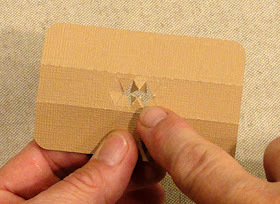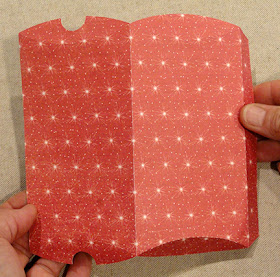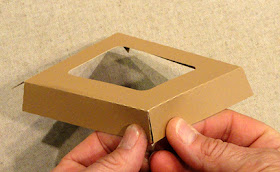ASSEMBLY: 1. Identify and cut the shapes:
A & B hull front/side and back/side panels
(NOTE: choose FRONT panel with or without
shield decoration punch holes as preferred.)
C roof "beam" triangle box shape
D circle opening reinforcement build up rings (4-5)
E hull reinforcement interior panel
F hull bottom reinforcement tray
G hull bottom concealing cover
H perch post
I post collar strips (help hold post in place)
J hull front accent shape
K hull sides accent shapes (2)
Not shown: hull back accent shape
L optional side accent raised panels (6 sets)
M bottom rim shape
N rim bottom concealment cover
O roof base with slots
P shake roof with tabs
Q roof accent shapes (2 sets)
2. If decorating the birdhouse front with
the Freedom banner or stars and stripes shield,
these are the shapes that are used:
A freedom "word cut" with bottom,
mid & top banner layers
B shield base shape
C & D cascade shapes
E shield assembly silhouette
F stars panel for contrast show-thru
G stars panel overlay
H stripes panel base silhouette
I stripes overlay (trim to size of H)
3. Position and attach stars face overlay
onto show-thru liner.
4. Position stripes overlay centered on top of shield base
silhouette . . .
. . . so that header is above top straight edge,
then attach stripe backsides to shield where both touch.
When glue is dry, trim away excess stripes overlay
so that cut edges are even with shield shape.
NOTE: it is easier to see the shield edge to follew
when working from the back.
5. Position the stars panel at top of shield assembly silhouette
and the stripes panel on bottom.
NOTE: it is possible to leave off the assembly silhouette
and simply place the two components directly onto
the offset shield base shape, if desired.
6. Position and attach the shield assembly
onto the offset shield base.
7. Add the side cascade shapes (left and right)
behind the shield layer
with punch holes lined up, then add mini brads
through holes or place studs over holes.
8. Prepare front (shown) and back hull panels by
bending back at edges of panels, also flange tabs.
9. Position hull shapes together with straight side edge
of one overlapping the side flange or the other,
bottom edges aligned, and glue side seam #1.
10. Prepare the reinforcement ring build up for
round opening by layering and gluing together
the ring shapes, taking care that all interior
cut edges line up as precisely as possible.
NOTE: it will be helpful to use a flat weight
(here and with other stacked and layered
built-up components) placed on top of the stack
until the unit is completely dried, to keep
shape flatted and avoid warping.
11. On the backside of the front hull, position
the ring build up stack to align with circle cutout,
and glue in place. (Use flat weight if possible.)
12. Prepare to add the hull accent side and front
(and back) accent panels by identifying the slat
build up alignment guide marks on the top
and near bottom of the side accent panels.
Position and attach accent panels to hull assembly.
13. Prepare the slat build up units by layering
and attaching the 4-5 strips exactly on top of
each other, taking care to align all edges as
precisely as possible. Prepare 6 total slats.
NOTE: the sample project shown here has a contrast
top strip layer which is also added to the stack.
14. Position and attach three slat units
on top of the side accent panels,
aligned at top of accent shape, using
guide marks. Flatten with weights if possible
during drying.
NOTE: the strips have been shortened in
the final cut file to eliminate interference
with bottom rim.
15. Form the hull into a tube to bring straight side
edge to overlap opposite flange, and complete
side seam #2.
(NOTE the symmetry of the hull will permit
it to be laid flat to apply pressure along the seam
while attaching.
16. Prepare the beam box shape by bending
back on all perforation lines.
17. Form the beam shape into a triangular tube
to bring straight front edge to overlap opposite
flange to perforation line, and glue seam.
Fold side triangle wall tabs inward, then tuck
into the end openings and glue in place.
Complete both ends.
18. Prepare to attach the beam to gable line
of hull assembly by applying glue to ends . . .
. . . and also to hull flange areas that
will overlap beam, then position between
hull front and back walls at crest, and
glue in place.
19. Apply glue to the hull flange faces on
right side, and right half of beam, then . . .
. . . bend roof panel over into position to
attach securely, taking care to line up
roof panel edges with hull gable edges.
20. Repeat for left side.
21. Prepare the perch post shape by bending back
on all perforation lines, flange, hex and triangle tabs.
22. Use a 3/8" wooden dowel as a press-against
form. Wrap the post shape around the dowel,
overlapping the straight long side edge over
the opposite flange perforation line, and glue
in place securely, moving finger pressure
along the length of the seam to ensure even joining.
23. With dowel inserted and aligned at hex base
on one end, mark opposite end at hex base edge
to determine cutting length, then cut dowel to size.
24. Bend tabs inward, and . . .
hex end over top of tabs, and glue in place.
Complete both ends.
25. Prepare the attachment collar shapes (2)
by bending back on all 5 tiny perf cuts.
26. Position one attachment collar over "back"
end of post, wrap so that perf bends align
with post shape angles, and glue in place.
27. Insert non-collared end through post opening
on hull back, push through hull interior, then
insert through front opening and push through until
collar stops the post.
Apply glue to collar inside surface, then reach
second collar shape inside hull to wrap around
and attach to post as close as possible to
the front hull wall.
28. Prepare reinforcement "collar" shapes by
bending side walls and flanges back.
29. Form each into a tray shape to join side wall
ends to opposite tabs. Complete all four corners
of each tray.
30. Apply glue to side walls and
insert the interior reinforcement into
the bottom of the hull, then . . .
. . . push upward to a position just below post
and shield attachment punch holes,
and glue in place.
31. Insert the bottom tray into hull opening, then . . .
. . . push in until bottom is flush with wall base edges.
32. Position and attach the bottom cover.
33. Prepare the base rim shape by bending back
on all perforation lines, except bend edge tabs
forward and rounded side end tabs forward.
Identify the miter angle cut on the rim top panels
that will overlap side walls, as indicated by
pointing finger.
This image identifies the rounded end tabs
of side walls . . .
. . . which are bent forward to eventually
tuck behind front or back rim walls.
34. Bend each side wall inward to form a tube
as edge tabs are inserted into corresponding slots.
On backside, bend tabs toward center
and glue in place to rim base underside.
Bend end square tabs inward, as well as
rounded inside wall end tabs as shown.
35. Bend front and back rims toward center
in similar manner, taking care during the process
that the square and rounded end tabs insert
inside the front or back tube
(apply dabs of adhesive first), with miter angled
edge overlapping side rim wall, as tabs are
inserted into slots as for side walls.
Add a dab of glue under the miter edge . . .
. . . then push front or back wall completely
into "tube" position, and glue tabs in place on back
as for side walls.
36. To assist attachment of side rim end tabs,
insert a narrow rod tool end into into
the corner openings to push and direct tabs behind
corresponding interior wall surfaces until secure.
37. Position and attach rim bottom concealing cover.
38. Insert hull assembly bottom into rim recess,
push fully down, and glue in place.
39. Prepare the roof base shape be bending back
on center ridge perforation lines.
40. Prepare shake roof overlay by bending back
(mountain folds) at center lines, also on end flanges,
and on two other panel lines as shown in following
diagram.
Bend forward (valley folds) near tabs.
41. Position shake roof overlay over roof base shape
with center ridge lines aligned, then insert upper row tabs
of overlay into corresponding slots in base.
On underside, bend tabs toward and glue in place.
42. Insert bottom row tabs into corresponding
slots, bend and glue in place as before.
42. Bend and wrap bottom flange of overlay
around base bottom edge, with edge at flange perf line,
and glue in place.
NOTE it will be helpful to insert a narrow rod-like
tool such as this knitting needle into the space
behind the flange to provide a "press-against"
surface to complete the seam.
43. Separate the roof base and overlay as much
as possible at ridge line to apply adhesive
to between along perforation line of one shape
or the other. Push together with ridge perfs
aligned, and apply pressure until the joint is secure.
44. Position and attach the concealing accent strips
to each roof level, with inner edge aligned along
tab perforation lines.
NOTE that widest strip is on top level.
45. Apply glue to the hull roof panels,
then position (centered front to back) roof unit
over the hull and attach in place.
46. Decorate as desired using one of several
layered banner designs (Freedom shown;
America, Liberty also available in size that fits)
and the stars and stripes shield.
Use dimensional foam squares under banner
if desired.
Here is completed project,
sturdy enough to display, then store until
next appropriate holiday for years to come.





















































































































